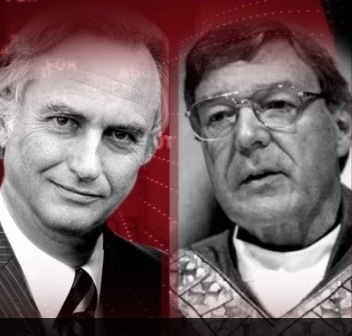One of my very first posts on this blog related to Cardinal Pell’s effective witness as a controversialist. (I’ve given up trying to retrieve the archive. No great loss to posterity, I’m sure.) It seems apt that the subject should be revisited so early in the blog’s second incarnation.
Last night’s Q&A discussion between Pell and Richard Dawkins was entertaining if nothing else. If you missed it, you can catch it on iView, or watch it on YouTube:
It was good TV. It didn’t have to be. The recent debate between Dawkins and Rowan Williams proves that! The BBC compared that exchange to “a rather polite philosophical chess game.”
I don’t think anyone would characterise last night’s encounter in such terms. A few cheap shots were attempted on both sides. And the disagreements weren’t exactly friendly. But it not only made for better TV, it also made for a more satisfying intellectual exchange.
We tend to say that passion obscures reasonable argument. I’m not so sure. Pell v Dawkins was a contest filled with a passion which lent itself to a clarity of ideas. In contrast, Williams v Dawkins was urbane and arcane, and frankly obscure.
I’d be surprised to learn that Pell or Dawkins won over any of their respective antagonists. But that’s not really the point. Both parties succeeded in revealing the heart and soul of the debate over God. They each presented the big ideas which underpin their competing philosophies. For that reason, last night’s debate was a worthy exercise, and it was also an edifying one. In the life of the mind — and, I would argue, in the life of the polis — robust debate is better than no debate.






I waited expectently for the debate but I think I felt let down. There was not enough “grunge” on the part of the Cardinal. I think/felt he was playing it safe. And some of the response perhaps left doubt in the mind of followers esepcailly those who are not into theological studies or studying the encyclicals/documents of the church.
I think I expected a more fiery Card. Pell and I know he can be fiery.
I hope it happens again.
Gosh. If the Cardinal wasn’t fiery on Monday night, I think you’d have the set burning by your definition Anne! Ha ha.
Good to see that your blog is up and running again!
Thanks mate. I’m learning who my most addicted loyal readers are, by starting up again low-key, and seeing who notices!
No Fr John Cdl Pell wasnt fiery, moments yes, but not his fiery self. There were moments where I felt he left things that should have been said unsaid, and left some confusion. However, overall I dont think either side “won”
Tony Abbott is an in-your-face Catholic. But when it comes to the question of an Australian head of state he is a tirotar to his Catholicism.Prior to the republican referendum Abbott was the executive director of Australians for Constitutional Monarchy and was a vocal supporter of the retention of the British monarch as Australia’s head of state. In a TV interview with Andrew Denton, former Liberal Party leader John Hewson related how Abbott told him that Australia would become a republic over his (Abbott’s) dead body.The laws of succession to the British (and hence Australian) throne state unequivocally that “it is inconsistent with the safety and welfare of this protestant kingdom to be governed by a papist” –Bill of Rights 1688. This is a law passed by a Westminster government and still on the statute books of both the United Kingdom and Australia. In other words Catholics are not to be trusted. The same Bill of Rights describes Catholicism is “this damnable doctrine.”How can any Catholic with a skerrick of principle in his body support a monarchy which is so violently and explicitly anti-Catholic? It would be the equivalent of a Jew in Germany supporting and speaking in favour of the Fuhrer.This is the man who has been selected by the Liberal Party as their leader and who aspires to become Australia’s prime minister. I will not vote for the Liberal Party member in my constituency. The thought of a man with Tony Abbott’s principles as prime minister frightens me. I wouldn’t trust him as far as I could throw him! Would you?